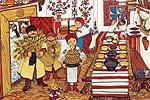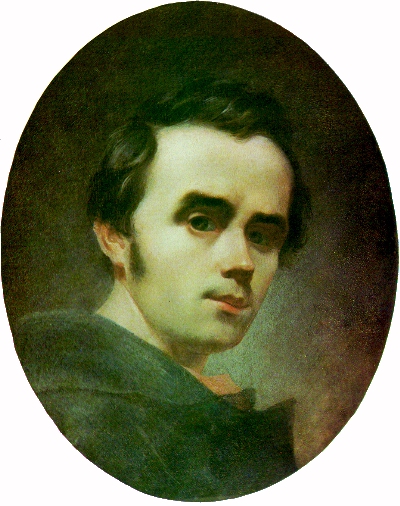 Ukrainian
Culture
Ukrainian
Culture

 |
||
 CHRISTMAS,
WHICH TAKES ITS NAME from Christ's Mass, was first celebrated on various dates from about 200 A.D. but was
finally set on December 25 by Bishop Liberus of Rome in 354 A.D. The December date, which almost coincides with
the winter solstice, became a popular festival of West Europe during the Middle Ages. But as late as the nineteenth
century, Christmas celebration was suppressed in Scotland and New England because of some religious differences.
All Christian nations have traditions which have become a part of the Christmas season. For example, England has
contributed the decorations of holly and mistletoe, carolling and gift giving.The Christmas tree is a medieval
German tradition and the immortal carol "Silent Night" also comes from Germany. The United States first
made Santa Claus popular in New York, popularized the Christmas card about 1846 and made the major contribution
to commercializing Christmas.
CHRISTMAS,
WHICH TAKES ITS NAME from Christ's Mass, was first celebrated on various dates from about 200 A.D. but was
finally set on December 25 by Bishop Liberus of Rome in 354 A.D. The December date, which almost coincides with
the winter solstice, became a popular festival of West Europe during the Middle Ages. But as late as the nineteenth
century, Christmas celebration was suppressed in Scotland and New England because of some religious differences.
All Christian nations have traditions which have become a part of the Christmas season. For example, England has
contributed the decorations of holly and mistletoe, carolling and gift giving.The Christmas tree is a medieval
German tradition and the immortal carol "Silent Night" also comes from Germany. The United States first
made Santa Claus popular in New York, popularized the Christmas card about 1846 and made the major contribution
to commercializing Christmas.
When Ukraine under King Volodymyr (St. Vladimir) accepted Christianity from Byzantium in 988 A.D. many pagan traditions
were in existence which were adapted by the Church to the new religion. Some of those traditions have survived
a thousand
years and now form a part of today s Christmas celebrations.
SVJATA VECHERYA OR "HOLY SUPPER" is the central tradition of the
beautiful Christmas Eve celebrations in Ukrainian
homes. The dinner table sometimes has a few wisps of hay on the embroidered table cloth as a reminder of the manger
in Bethlehem. Many Canadian and American families wear their Ukrainian embroidered shirts on this occasion.
Ukrainian
homes. The dinner table sometimes has a few wisps of hay on the embroidered table cloth as a reminder of the manger
in Bethlehem. Many Canadian and American families wear their Ukrainian embroidered shirts on this occasion.
AT THE END OF THE SVJATA VECHERYA the family often sings Kolyadky, Ukrainian Christmas Carols. In many communities the old Ukrainian tradition of carolling is carried on by groups of young people and members of organizations and churches calling at homes and collecting donations.
WHY DO UKRAINIANS CELEBRATE Christmas on January 7th rather than December
25th? Many people wonder why
the Ukrainian date is thirteen days later and only a few people are aware that it is related to a change from the
calendar which
was in use two thousand years ago.
Tradition plays a great part in the lives of people of Ukrainian origin and it is for this reason that they have
continued to
celebrate Christmas on the old date that would have been observed by all Christians.
The Roman calendar that had been in use since the eighth century B.C. originally started the year on March 1 and
had 10 months as the names of the months themselves indicate, September (7), October (8), November (9) and December
(10). Eventually two months were added, Januarius and Februarius, and the year was started on January. However,
it was only 355 days long so it had over ten days error and the seasons and the calendar over the years continued
to lose their correct relationship.
Taras Shevchenko: Ukrainian Writer
 Taras Shevchenko
was born on March 9, 1814 in the Ukrainian village of Moryntsi. His parents were serfs and lived in bitter poverty;
both died before Taras was twelve years old. What saved the boy from being submerged in the sea of indigence were
his native intelligence and artistic talent. The overseer of the estate selected him for duties in the manor house
of the landowner, Engelhardt, to whose young son Shevchenko became a page-boy. The new duties provided Shevchenko
with the opportunity of travelling in the retinue of his master and of copying pictures and works of art. When
Engelhardt discovered his serf's unusual skill he promptly apprenticed him to various painters as he travelled
to Vilno, Warsaw and St. Petersburg. It was in St. Petersburg that Shevchenko's talent was noticed by some of his
compatriots who were eager to see him enrolled as a student at the Imperial Academy of Fine Arts. This was impossible
as long as Shevchenko was a serf. On the initiative of some professors and friends the money necessary to purchase
his freedom was raised and in 1838 Shevchenko was liberated from serfdom.
Taras Shevchenko
was born on March 9, 1814 in the Ukrainian village of Moryntsi. His parents were serfs and lived in bitter poverty;
both died before Taras was twelve years old. What saved the boy from being submerged in the sea of indigence were
his native intelligence and artistic talent. The overseer of the estate selected him for duties in the manor house
of the landowner, Engelhardt, to whose young son Shevchenko became a page-boy. The new duties provided Shevchenko
with the opportunity of travelling in the retinue of his master and of copying pictures and works of art. When
Engelhardt discovered his serf's unusual skill he promptly apprenticed him to various painters as he travelled
to Vilno, Warsaw and St. Petersburg. It was in St. Petersburg that Shevchenko's talent was noticed by some of his
compatriots who were eager to see him enrolled as a student at the Imperial Academy of Fine Arts. This was impossible
as long as Shevchenko was a serf. On the initiative of some professors and friends the money necessary to purchase
his freedom was raised and in 1838 Shevchenko was liberated from serfdom.
The successes which Shevchenko attained as a student at the Academy did not satisfy him. Sometime in the late 1830's
he started to write poetry, at first ballads and lyrics in the current vogue of Romanticism, and later historical
poems depicting the past glories of the Cossack Ukraine. Soon he directed his pen against the social injustices
of his own time and above all against the political and cultural oppression of the Ukraine by the Russians. In
1840 his first collection of poems, Kobzar, stirred a wide response among his countrymen. Gradually, Shevchenko
became an uncompromising
revolutionary, a member of the liberal Ukrainian society, the Brotherhood of Sts. Cyril and Methodius, and a rebel
with a
definite cause. His plea was not merely for the political independence of the Ukraine, but for a just new order
among all Slavs.
Shevchenko was never narrowly nationalistic, for his hope lay in the regeneration of charity, tolerance and freedom
among all
men. In his satires he castigated with equal venom both the Russian rulers and bureaucrats and his opportunistic
and philistine
countrymen. His popularity in the Ukraine he owed also to his simple yet highly poetic language which laid the
foundation of
modern Ukrainian literature.
In 1847 Shevchenko was arrested and charged with belonging to an illegal society and with writing insolent, revolutionary
poetry. He was sentenced to serve as a private soldier in the Orenburg district. The tsar, in his own handwriting,
demanded that
the poet be placed "under the strictest supervision with a prohibition of writing and sketching." For
the next ten years
Shevchenko lived the life of an exile under the military discipline of the Empire he hated so much. However, he
managed to
write secretly and even to paint. The poems from that period show a more detached and philosophic attitude to life;
his hostility
to the regime was unchanged. After his release in 1857, Shevchenko was in poor health and he died, unmarried, in
St.
Petersburg on March 10, 1861.